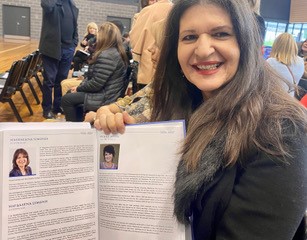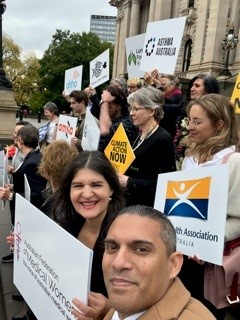Through the years, Greek Australian Magdalena Simonis AM has contributed to medicine and to women’s health in so many ways that it is hard to sum up her achievements. Holding positions on several not-for-profit organisations and government advisory groups, as well as bridging gaps across the health sector, Simonis’ role expands into many different fields.
She has been on the Royal Australian College of General Practitioners (RACGP) Expert Committee for Quality Care for several years and before that on the e-Health Committee. She has also been on national boards of government-funded health organisations. In 2023, Ms Simonis was also recognised in the King’s Birthday Honours.
This journey has all been fueled by her passion for health equity, health literacy and community.
Tell us about your Greek heritage. How connected are you with it?
My mother came from Thessaloniki and my father from Chalkidiki. I was born in Australia and like many children of the post-war migrants of the 1950s, I grew up in a milk-bar which also functioned as a fish and chip shop. I went to Greek school two nights per week and to Greek church on Sundays. Everything we did was Greek – family gatherings, name days, the movies on a Saturday night at the National Cinema in Richmond which played Indian movies with Greek subtitles.
Years later, in the 1990s, the death of President Tito of Yugoslavia resulted in Balkan conflict and during that time, I became actively involved in the Macedonian issue with the Australian Institute of Macedonian Studies. A group of us worked on a white paper which was submitted to the then-Minister for Foreign Affairs, outlining the ancient Greek heritage of the Macedonian region, which includes the parts of the region which have been absorbed into the Balkans. We emphasised the importance of calling out historical inaccuracies, including the appropriation of Greek symbols such as the star of Vergina and coordinated media sessions, public seminars to promote historical accuracy.
It was a time of intense activism. I was interviewed frequently and wrote editorial articles for mainstream media and it was during this time that I met my husband who was born in Thessaloniki too. Our two children went to Greek school from prep and almost made it through to final year of secondary school.

What made you choose a career in the health sector? What sacrifices did you have to make on the way and how rewarding is to do something you love in your life?
I made the decision to become a doctor at the age of seven. Since that time, there is little else I would prefer to do as a profession. This interest stemmed from my love of nurturing anything from insects, kittens, chickens, rabbits and eventually, people. The milk bar I grew up in was opposite my primary school and the children would come in to buy their lollies. Some would have grazes from playing in the school ground, which were all just bitumen in those days, and I would offer to clean and dress the oozing sores on their knees with diluted Dettol. I also provided tissues to kids with runny noses. Even as early as grade 2, I was the ‘go to’ for injuries that occurred in the playground. There are no other doctors in my family so during my teen years, watching MASH was hugely inspirational and I still love watching the replays.
The best thing about being a GP is the human contact and building relationships that teach me about people, life and medicine. I also love that I can conduct research through the department of General Practice at Melbourne University.
Tell us about your yearly contribution to the Royal Australian College General Practitioners (RACGP).
The RACGP is my professional home and it represents my medical family. As a GP, the contact we have with patients is very special and the skills we develop are derived partly from the teaching we receive through our ongoing learning programmes and from our day-to-day practice.
Discussing cases and learning from your peers is central to being a good doctor and the RACGP is like one big village. One of the lessons I learned early in life is that if you offer to contribute your skills by giving your time, you get more out of being a part of a large organisation. This principle has led me to maintain a close involvement with RACGP by offering to examine GP trainees, working on the expert committees with skilled doctors, researchers and educators and by committing to my ongoing learning. The more you give, the more you get. As a rule, I prefer to take action rather than criticise and have found this a constructive way of achieving outcomes desired.
Part of my role on the expert committees has involved reviewing guidelines, producing educational material for the college and representing the RACGP at several National Inquiries – some of these include Endometriosis, Cervical Screening, Transvaginal Mesh, Cosmetic Surgery Review, Endometrial Carcinoma, Breast Implants Expert Advisory group, Family Violence.
What was your role at the time of the COVID-19 pandemic?
The pandemic was a difficult time for all of the health profession but general practitioners felt it in ways that others didn’t. We didn’t receive Protective Personal Equipment (PPE) supplies and knew that hospitals were prioritised. National pandemic response procedures focused on hospitals, and despite the fact that GP practices are community facing, we could not screen our patients in the way hospitals could, so we had to create our own protection protocols.
During the initial months, fear of infecting my family meant taking certain precautions that created more distance between myself and my family within my own home. Health information issued by government departments was lagging behind and people were presenting with fears, doubts, conspiracy theories – so much of this was due to the lack of clarity around the disease, misinformation shared on social media, messaging received from overseas friends and family, as well as fear and confusion around how long the pandemic would last.
As a GP, I figured that my colleagues were also experiencing similar frustrations as I was, and that for patients for whom English was not their native language they would be even more worse off than anybody else. As a response to this, I wrote several articles simplifying the medical information, for both my colleagues, my patients and the Greek speaking community. Speaking Greek was very useful during this time as it meant I could conduct Q+A interviews around COVID-19 for the Greek community. In my role as a leader of a national medical women women’s organisation, we coordinated regular online webinars for our members and non-members, I wrote prolifically and presented weekly on various professional and public facing panels.
This was also the time I decided to instigate an international survey of women doctor experiences and collaborated with colleagues from overseas. I also participated in Government Expert Advisory groups on the National COVID-19 Taskforce, and became involved in the church based vaccination program coordinated by the Greek Community of Melbourne, the Hellenic Doctors Society of Australia and the City of Darebin.
In April of 2022, I was privileged to receive the AMA (Vic) Patrick Pritzwald-Steggman Award, which celebrates a doctor who has made an exceptional contribution to the wellbeing of their colleagues and the community and was a Women’s Agenda 2022 finalist for Emerging Leader in Health.


Tell us about your past contribution to women’s health? Where are we at currently in Australia when it comes to initiatives around women’s health?
My involvement in women’s health has been diverse and spans my entire career, from being an obstetric trained GP doing shared antenatal care, to becoming involved in the Government-funded consumer facing health information website, called Your Fertility, as an expert advisor around preconception health.
Areas I am also involved with are endometriosis in my role on The National Endometriosis Expert Advisory Group, family violence through the Safer Families Centre of Research Excellence University of Melbourne as well as the RACGP Family Violence education programs for GPs, gender equity, a GP advisor at the National Transvaginal mesh inquiry, and the Cosmetic Surgery review.
All of these have been important inquires which have listened to women who experienced these conditions and have informed the strategies to address their concerns. They have resulted in health professional education which is where I come in at the GP level, and education of the public with access to information through online portals, treatment facilities and commitment by government to improve outcomes.
An example of this is the National Endometriosis Plan of 2018 of which I am on the team involved in overseeing the implementation of the recommendations over the next five years. The Royal Commission into Family Violence has resulted in the establishment of some of the programmes I am involved with, the National Sexual and Reproductive Health Strategy and the recent National Inquiry on Gender Equity have each brought us closer to achieving the outcomes required. There is a lot that still needs to be done to address the inequity facing women in rural and remote regions of Australia, our First Nations Women and migrant and refugee women.
Is there enough women representation in decision-making roles in the health sector? What should be done to improve the situation?
The representation of women in health leadership roles in Australia does not reflect their level of participation in the health care workforce. The National Women’s Health Advisory Council established in 2023 is comprised of almost all women and its sole purpose is to address the big issues of inequality across the health sector and provide advice on the implementation of the National Women’s Health Strategy 2020-2030 (Strategy). It is a positive move and invite women such as myself to contribute to policy development.
During COVID-19 we saw a lot of women step up in their roles, however much of this was driven by the need to act. Most of the leadership roles however, were still occupied by males. There are many imbalances in the health sector when you consider that women comprise around 50 percent of the medical student cohorts, yet the majority of the training programs are given to male students as are leadership roles.
Getting into specialty training positions medicine is a very competitive process and although women are quite successful at getting into these, there is a lack of support for women who choose to conceive or who are parents during these programs. Flexible training programs and onsite childcare would make a world of difference to this and would benefit everyone who has children.
